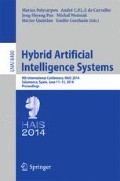Abstract
In this paper we present novel experimental results on comparing two interpretations of missing attribute values: attribute-concept values and “do not care” conditions. Experiments were conducted on 176 data sets, with preprocessing using three kinds of probabilistic approximations (lower, middle and upper) and the MLEM2 rule induction system. The performance was evaluated using the error rate computed by ten-fold cross validation. At 5% statistical significance level, in four cases attribute-concept values and in two cases “do not care” conditions performed better (out of 24 cases). At 10% statistical significance level, in five cases attribute-concept values and in three cases “do not care” conditions performed better. In the remaining cases the differences were not statistically significant.
Access this chapter
Tax calculation will be finalised at checkout
Purchases are for personal use only
Preview
Unable to display preview. Download preview PDF.
References
Clark, P.G., Grzymala-Busse, J.W.: Experiments on probabilistic approximations. In: Proceedings of the 2011 IEEE International Conference on Granular Computing, pp. 144–149 (2011)
Clark, P.G., Grzymala-Busse, J.W.: Experiments on rule induction from incomplete data using three probabilistic approximations. In: Proceedings of the 2012 IEEE International Conference on Granular Computing, pp. 90–95 (2012)
Clark, P.G., Grzymala-Busse, J.W.: Experiments using three probabilistic approximations for rule induction from incomplete data sets. In: Proceeedings of the MCCSIS 2012, IADIS European Conference on Data Mining, ECDM 2012, pp. 72–78 (2012)
Clark, P.G., Grzymala-Busse, J.W.: Rule induction using probabilistic approximations and data with missing attribute values. Proceedings of the 15th IASTED International Conference on Artificial Intelligence and Soft Computing, ASC 2012, pp. 235–242 (2012)
Clark, P.G., Grzymała-Busse, J.W.: An experimental comparison of three interpretations of missing attribute values using probabilistic approximations. In: Ciucci, D., Inuiguchi, M., Yao, Y., Ślęzak, D., Wang, G. (eds.) RSFDGrC 2013. LNCS, vol. 8170, pp. 77–86. Springer, Heidelberg (2013)
Grzymala-Busse, J.W.: On the unknown attribute values in learning from examples. In: Raś, Z.W., Zemankova, M. (eds.) ISMIS 1991. LNCS, vol. 542, pp. 368–377. Springer, Heidelberg (1991)
Grzymala-Busse, J.W.: LERS—a system for learning from examples based on rough sets. In: Slowinski, R. (ed.) Intelligent Decision Support. Handbook of Applications and Advances of the Rough Set Theory, pp. 3–18. Kluwer Academic Publishers, Dordrecht (1992)
Grzymala-Busse, J.W.: MLEM2: A new algorithm for rule induction from imperfect data. In: Proceedings of the 9th International Conference on Information Processing and Management of Uncertainty in Knowledge-Based Systems, pp. 243–250 (2002)
Grzymala-Busse, J.W.: Rough set strategies to data with missing attribute values. In: Workshop Notes, Foundations and New Directions of Data Mining, in conjunction with the 3rd International Conference on Data Mining, pp. 56–63 (2003)
Grzymala-Busse, J.W.: Three approaches to missing attribute values—a rough set perspective. In: Proceedings of the Workshop on Foundation of Data Mining, in conjunction with the Fourth IEEE International Conference on Data Mining, pp. 55–62 (2004)
Grzymała-Busse, J.W.: Generalized parameterized approximations. In: Yao, J., Ramanna, S., Wang, G., Suraj, Z. (eds.) RSKT 2011. LNCS, vol. 6954, pp. 136–145. Springer, Heidelberg (2011)
Grzymala-Busse, J.W., Ziarko, W.: Data mining based on rough sets. In: Wang, J. (ed.) Data Mining: Opportunities and Challenges, pp. 142–173. Idea Group Publ., Hershey (2003)
Kryszkiewicz, M.: Rough set approach to incomplete information systems. In: Proceedings of the Second Annual Joint Conference on Information Sciences, pp. 194–197 (1995)
Pawlak, Z.: Rough sets. International Journal of Computer and Information Sciences 11, 341–356 (1982)
Pawlak, Z., Skowron, A.: Rough sets: Some extensions. Information Sciences 177, 28–40 (2007)
Pawlak, Z., Wong, S.K.M., Ziarko, W.: Rough sets: probabilistic versus deterministic approach. International Journal of Man-Machine Studies 29, 81–95 (1988)
Ślęzak, D., Ziarko, W.: The investigation of the bayesian rough set model. International Journal of Approximate Reasoning 40, 81–91 (2005)
Stefanowski, J., Tsoukiàs, A.: On the extension of rough sets under incomplete information. In: Zhong, N., Skowron, A., Ohsuga, S. (eds.) RSFDGrC 1999. LNCS (LNAI), vol. 1711, pp. 73–82. Springer, Heidelberg (1999)
Wolpert, D.H.: The supervised learning no-free-lunch theorems. In: Soft Computing and Industry, pp. 25–42. Springer (2002)
Wong, S.K.M., Ziarko, W.: INFER—an adaptive decision support system based on the probabilistic approximate classification. In: Proceedings of the 6th International Workshop on Expert Systems and their Applications, pp. 713–726 (1986)
Wozniak, M., Graña, M., Corchado, E.: A survey of multiple classifier systems as hybrid systems. Information Fusion 16, 3–17 (2014)
Yao, Y.Y.: Probabilistic rough set approximations. International Journal of Approximate Reasoning 49, 255–271 (2008)
Yao, Y.Y., Wong, S.K.M.: A decision theoretic framework for approximate concepts. International Journal of Man-Machine Studies 37, 793–809 (1992)
Ziarko, W.: Variable precision rough set model. Journal of Computer and System Sciences 46(1), 39–59 (1993)
Ziarko, W.: Probabilistic approach to rough sets. International Journal of Approximate Reasoning 49, 272–284 (2008)
Author information
Authors and Affiliations
Editor information
Editors and Affiliations
Rights and permissions
Copyright information
© 2014 Springer International Publishing Switzerland
About this paper
Cite this paper
Clark, P.G., Grzymala-Busse, J.W. (2014). Mining Incomplete Data with Attribute-Concept Values and “Do Not Care” Conditions. In: Polycarpou, M., de Carvalho, A.C.P.L.F., Pan, JS., Woźniak, M., Quintian, H., Corchado, E. (eds) Hybrid Artificial Intelligence Systems. HAIS 2014. Lecture Notes in Computer Science(), vol 8480. Springer, Cham. https://doi.org/10.1007/978-3-319-07617-1_14
Download citation
DOI: https://doi.org/10.1007/978-3-319-07617-1_14
Publisher Name: Springer, Cham
Print ISBN: 978-3-319-07616-4
Online ISBN: 978-3-319-07617-1
eBook Packages: Computer ScienceComputer Science (R0)

